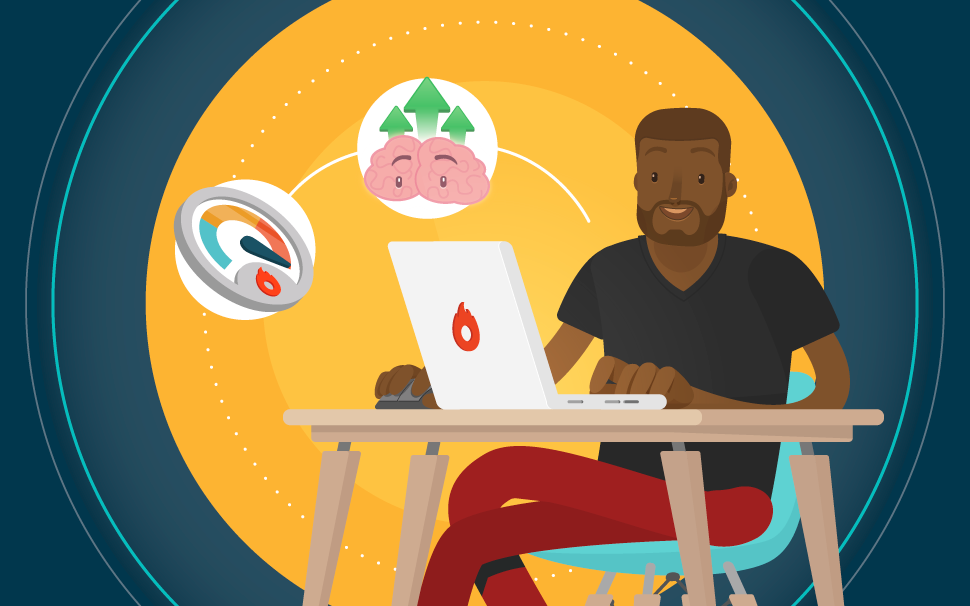
How to improve your performance when studying online?
Find out how to overcome the challenges of distance education with 12 valuable tips!

What will we see in this post
- Have a plan
- Organize your time
- Prioritize the right things at the right time
- Have a suitable study space
- Know your limits
- Avoid distractions
- Take breaks
- Don’t put something important off until the last minute
- Always clear up your questions
- Broaden your knowledge
- Do your schoolwork and put what you have learned into practice
- Make sure that you’ve chosen something you really like to study

We constantly talk about how important distance education has become all over the world. And today, we’ll take an in-depth look at them so you can do well when it comes to distance learning.
With Distance Education becoming a trend, students that choose this type of education are seeking methods and strategies that can help them with this trendy form of learning and its challenges.
But the tips we’re going to see, in addition to being useful for distance education students, can also be used by those who take in-class courses, since they might have difficulty concentrating when they study at home.
The barrier for those who have this difficulty usually involves not knowing how to prepare, not finding motivation and the distractions that can be found everywhere, right?
Aware of this, we’ve prepared a practical guide with valuable tips for you who feels it is impossible to perform better.
Learn how to study online:
1- Have a plan
Whether for college, any courses you take, or any decision you make in life, planning helps you choose the right path and prepare yourself for the journey.
Certain people find planning easy, others not so much, and the latter are those who need the advice in this guide the most.
Planning means to assess the path and create a yardstick for the future.
When we have this in mind, we make the process more fluid and it becomes easier to overcome possible pitfalls.
The following are part of the planning for distance learning:
- Have a clear objective. For example, “I’m going to dedicate myself to this course because I wish to work in this area in 3 years “; or, “I really like this subject and I want to specialize in it “; or; “I want to pass all school subjects with good grades “. They may be life goals or simple things to which you add something you really want.
- Know everything you need to study beforehand. Know your schedule, read the course description, the subject’s teaching plan and get the necessary didactic materials.
- Organize your tasks in a manner that is best for you. For example, from the most complex to the easiest, or vice versa.
- Use tools to assist in your planning. A few that we suggest are Google Keep, Evernote, Trello, and Todoist. With these apps, you can create lists and organize tasks, which will make your life easier. Not to mention that you can use the tools installed in every smartphone, such as calendar, reminders and alarm clock, which can remind you of your tasks.
- Establish rules. For example, wake up early during the week, don’t watch your favorite series until you’ve finished studying the material scheduled for that day, etc. Writing down notes, in somewhere visible, to help you memorize.

2- Organize your time
After you’ve finished planning, it’s time to set aside time from your daily routine, in order to study. You might have to change it or give up on certain things in order to put your study plan into practice.
Despite the flexibility that distance education courses provide, if you don’t have a schedule to do your tasks, your goal may be lost. Your tasks will then accumulate and by the time you wake up, it has snowballed.
So, it’s better to be safe than sorry! And the best way of doing this is by creating your own schedule, which can be a schedule containing only your study times or with your daily activities.
We recommend that you include everything, because by doing so, your routine will be optimized as a whole.
Check out below how to create a schedule:
- You can create a table with the days of the week on a horizontal line and times on a vertical column.
- Define your most important daily activities such as your wake up time, the time you go to bed, the time for your meals, to study and also, to rest.
- Define what you will study every day.
- Afterward, put your table up someplace visible, preferably a place you will see as soon as you wake up, so you can get ready for your day.
- If you prefer, create a schedule including only your study times and define what you will study each day. You can also create check boxes, as goals to be checked off whenever the task has been concluded.

3- Prioritize the right things at the right time
Prioritizing means making choices. No one but you knows what you should prioritize, so you will have to do it, but try to make the correct choices.
But, how do I know if I’m prioritizing the right things? This is where you think about your planning and your goals.
For example, you have a test and feel unsure about the subject. Your friends invite you to go out a day before and your goal is to get a good grade.
This is when you have to understand that if you choose to go out, your goal is at greater risk of not being achieved.
Therefore, prioritize staying at home and study a little more, and then you can work out the other things.
On the other hand, if you are overloaded, feeling tired and are getting nowhere in terms of performance, prioritize taking a break, performing other activities and then get back to studying after you feel better.
4- Have a suitable study space
One thing is certain: those who need to study at home must have a space equipped with a table, a comfortable chair, good lighting, and most importantly, which is quiet.
Sometimes you might even prefer your couch or bed, or even on the bus; after all, one of the advantages of distance learning is being able to choose how and when you will study.
However, sometimes a suitable space is required so you don’t hurt your back, and a peaceful space to help you concentrate better. You are the one who will benefit 100% from this and you will absorb the content better, do better in your studies and also take care of your health!
5- Know your limits
Although we sometimes want to put the cart before the horse, whether to achieve our goal faster or for other reasons, overdoing it is never good.
Knowing your limits means analyzing what you have set out to do and compare it with reality. Know when to stop or even change if something isn’t good for you.
Good performance has a direct relationship with your exclusive dedication to what your limits allow.
6- Avoid distractions
Distractions are common even in the classroom. In our connected world, distractions are even more numerous outside of the classroom.
What you need to do in order to improve your performance is to do your best to keep distractions from getting in your way. There are a few strategies to do so:
- While you’re on the Internet, close the browser tabs, programs, and applications that have nothing to do with what you are researching;
- Turn your cell phone silent mode on or put it far from you;
- Do one activity at a time;
- Study in a noise-free environment and away from other people;
- Whenever you get tired, take breaks.
7- Take breaks
As mentioned earlier, it is extremely important to take breaks when you are studying.
Neuroscience explains that our brain can only concentrate for short periods, approximately between 50 and 60 minutes, after this period of time, attention is inevitably lost.
In order to maintain active focus, it is recommended that you take breaks after this period of concentration to do something different and rest your brain.
In addition, eating healthy and drinking plenty of water is also part of it. Use these breaks to have a snack and then go back to studying hard.

8- Don’t put something important off until the last minute
Leaving something until the last minute probably won’t create good results. In order to avoid poor deliveries, accumulation of work and stress, try to do the large and most important activities progressively.
Especially if you wish to deliver the best version possible. Assess the importance of what you have to do, the size of the task, and organize in your planning how much time you will have to dedicate to it.
This care will ensure a greater possibility of excellence in your work.
9- Always clear up your questions
Whenever you have questions, don’t hesitate in asking your teacher, an expert, or consult discussion forums, talk to your course classmates or search on Google.
Every question is important and seeking knowledge will only make you better in what you are studying.
10- Broaden your knowledge
Something that will, in fact, influence your performance is learning more about the subject you’re studying.
Perhaps you won’t immediately be interested in broadening your knowledge, but sometimes researching other materials on the subject may lead you to having a different perspective.
Never stop trying to learn about those subjects you don’t know about, which were mentioned in a subject.
Technology provides us with the incredible possibility of searching for absolutely any subject; why not use it to your advantage?
Search for other formats such as videos, films, podcasts, blogs, etc. In addition to piquing your interest and making studying less boring, you will expand your culture and knowledge, which is great for your intellectual development.
11- Do your schoolwork and put what you have learned into practice
In addition to studying, doing your schoolwork is very important to help you memorize the subject material. Whenever you feel that you haven’t fully memorized a subject, do all the course exercises, find others, and also do them if necessary.
Another way to absorb the content is by putting theory into practice. Even if it’s not a task to be done, find other ways to apply it. You can start practicing by doing freelance work, for example.
12- Make sure that you’ve chosen something you really like to study
Not liking certain subjects you are studying and being disappointed with a poor performance is part of the process. It’s okay if this happens every now or then during your journey.
However, if you apply the strategies, work hard and still can’t pick up the pace, it might be the moment to reassess the reasons for this misalignment with your studies.
When we are doing what we truly like, despite certain difficulties, in the end, we feel gratified, and if there are hurdles, we easily overcome them with help. Pay attention to these signs!

BONUS: how to motivate yourself?
Finally, the tip is, learn how to motivate yourself whenever you feel discouraged.
Some forms of motivating yourself:
- Make new choices whenever necessary;
- Don’t be afraid to make mistakes;
- Learn something new every day.
But these are only 3 ways to stay motivated. To learn more, check out our post with 9 ways to motivate yourself whenever you feel discouraged!




